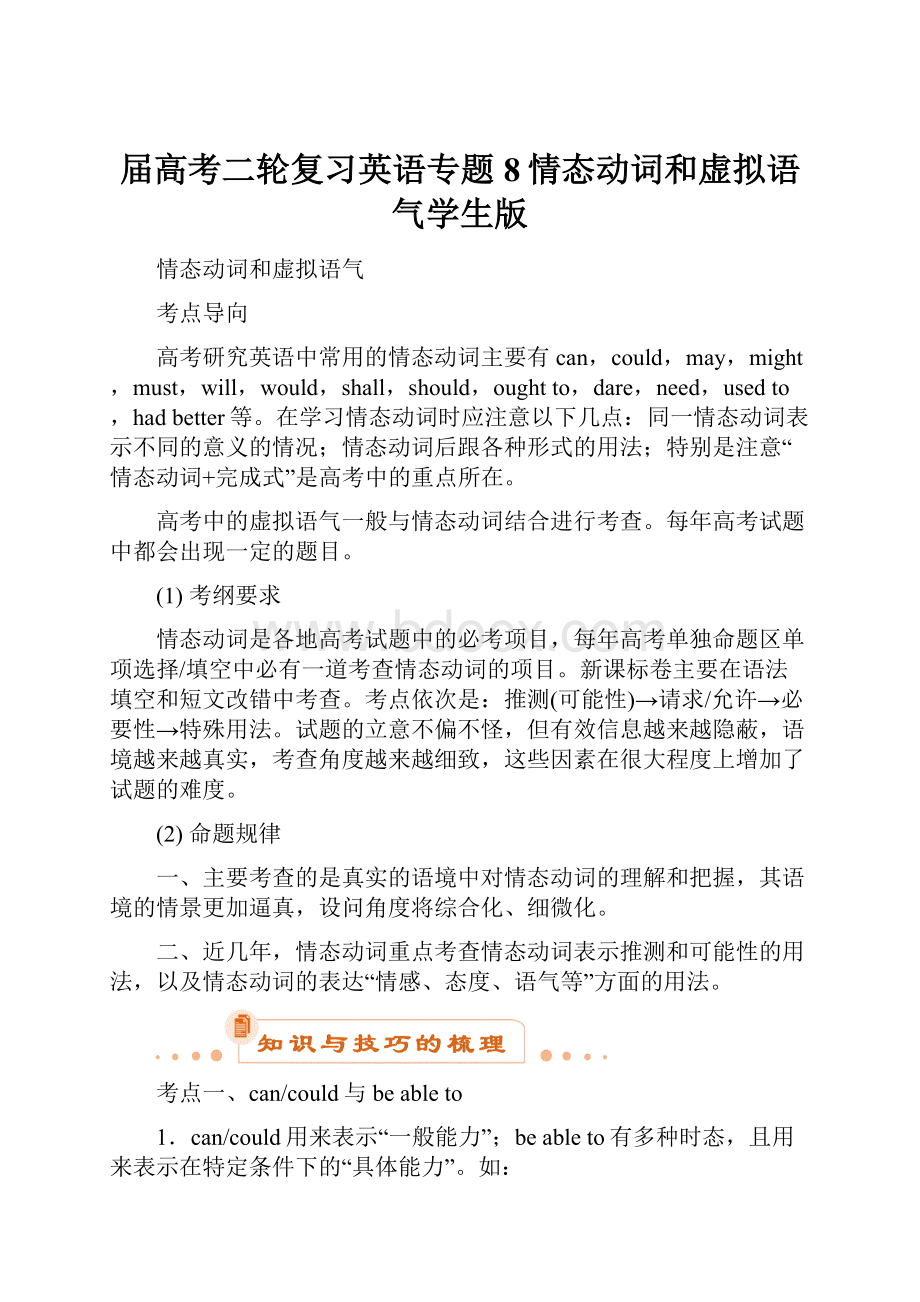届高考二轮复习英语专题8情态动词和虚拟语气学生版.docx
《届高考二轮复习英语专题8情态动词和虚拟语气学生版.docx》由会员分享,可在线阅读,更多相关《届高考二轮复习英语专题8情态动词和虚拟语气学生版.docx(16页珍藏版)》请在冰豆网上搜索。

届高考二轮复习英语专题8情态动词和虚拟语气学生版
情态动词和虚拟语气
考点导向
高考研究英语中常用的情态动词主要有can,could,may,might,must,will,would,shall,should,oughtto,dare,need,usedto,hadbetter等。
在学习情态动词时应注意以下几点:
同一情态动词表示不同的意义的情况;情态动词后跟各种形式的用法;特别是注意“情态动词+完成式”是高考中的重点所在。
高考中的虚拟语气一般与情态动词结合进行考查。
每年高考试题中都会出现一定的题目。
(1)考纲要求
情态动词是各地高考试题中的必考项目,每年高考单独命题区单项选择/填空中必有一道考查情态动词的项目。
新课标卷主要在语法填空和短文改错中考查。
考点依次是:
推测(可能性)→请求/允许→必要性→特殊用法。
试题的立意不偏不怪,但有效信息越来越隐蔽,语境越来越真实,考查角度越来越细致,这些因素在很大程度上增加了试题的难度。
(2)命题规律
一、主要考查的是真实的语境中对情态动词的理解和把握,其语境的情景更加逼真,设问角度将综合化、细微化。
二、近几年,情态动词重点考查情态动词表示推测和可能性的用法,以及情态动词的表达“情感、态度、语气等”方面的用法。
考点一、can/could与beableto
1.can/could用来表示“一般能力”;beableto有多种时态,且用来表示在特定条件下的“具体能力”。
如:
Mygrandmaisoverseventy,butshecanstillreadwithoutglasses.
Theywillbeabletotellyouthenewssoon.
HewasabletofleeEuropebeforethewarbrokeout.
2.表示允许可用can或could,与may或might意义接近。
could可用于现在时,只是语气更加委婉、客气,回答时则一般要用can而不用could。
—CouldIhavethetelevisionon?
—Yes,youcan./No,youcan’t.
考点二、may与might
1.表示允许,意为“可以,许可”,用法基本上同can与could。
如:
MayIuseyourbicycle?
2.表示可能性,意为“也许,可能”。
如:
Accordingtotheweatherforecast,itmayraintomorrow.
3.may可以放在句首,表示祝愿。
如:
Maygoodluckbeyours!
考点三、must与haveto
1.must用来表示说话人的主观看法;haveto表示客观的需要,强调外界压力,不得已而为之。
如:
Hesaidthattheymustworkhard。
他说他们必须努力工作。
(主观上要做这件事)
Mybrotherwasill,soIhadtocallthedoctorinthemiddleofthenight.
我弟弟生病了,我只得半夜里把医生请来。
(客观上需要做这件事)
2.表示“不必”,须用don’thaveto或needn’t。
must的否定式表示“禁止,绝对不可”。
如:
Youdon’thavetotellhimaboutit.
你不必告诉他那件事。
Youmustn’ttellhimaboutit.
你绝不能告诉他那件事。
—Mustwedoitnow?
我们必须现在做吗?
—No,youneedn’t.
不,你们不必。
考点四、shall
1.用于第一、第三人称的疑问句中,用来征求对方的意见或请求指示。
如:
Whatshallhedonext?
他下一步干什么呢?
2.用于第二、第三人称的陈述句中,表示说话人的意愿,有“命令、警告、允诺、威胁、强制”等意思。
如:
Heshallstayinbed.
他必须躺在床上。
Youshallhaveitbacknextweek.
下周一定还你。
Hesayshewon’tgo,butIsayheshall.
他说他不去,但我说他必须去。
考点五、will与would
1.will用于各种人称,表示“意志、意愿”或“决心”等。
如:
Ifyouwillkeepyourwatchhalfanhourslow,itishardlysurprisingthatyouarelateforyourappointments.
如果你要让你的表慢半个小时,你约会时迟到就不足为怪了。
2.will表示习惯性的动作,有“总是,惯于”的含义。
如:
AnEnglishmanwillusuallyshowyouthewayinthestreet.
英国人通常是会在街上给你指路的。
3.would可表示过去反复发生的动作。
如:
OnSundayshewouldgetupearlyandgofishing.
星期天他总是早起去钓鱼。
考点六、should与oughtto
1.should表示“建议”或“劝告”,有“应该”之意。
如:
Youshouldlearnfromeachother.
2.oughtto表示根据某种义务或必要“应当”做某事。
如:
Everyoneoughttoobeythetrafficregulations.
3.should和oughtto也可用来表示推测,意为“想必会……”。
如:
—WhencanIcomeforthephotos?
Ineedthemtomorrowafternoon.
—Theyshouldbereadyby12:
00.
考点七、情态动词表示推测
1.can用于肯定句中表示客观的可能性,意为“有时会”;用于疑问句中可以表示推测,意为“可能”,有时表示一种惊讶的语气;用于否定句中也可以表示推测,can’t意为“不可能”,语气很强烈。
ItisusuallywarminmyhometowninMarch,butitcanberathercoldsometimes.
我的家乡在三月份通常很暖和,但有时候也会相当冷。
Mr.Bushisontimeforeverything.Howcanitbethathewaslateforthemeeting?
布什先生做什么事情都很准时,他怎么可能开会迟到呢?
—Let’svisitTomtogether,Stephen.
—There’snoneedtodoso.Hecan’tbeathome,becauseIsawhimboardtheflighttoBeijingthismorning.
——Stephen,咱们一起看看汤姆吧。
——没必要这样做。
他一定不在家,因为今天早晨我看见他登上了飞往北京的航班。
2.may/might用于肯定句中可以用来表示不十分肯定的推测,意为“有可能”;用于否定句中也可以表示推测,maynot意为“可能不”,表示一种不太确定的语气。
Thetrafficisheavythesedays.Imightarriveabitlate,socouldyousavemeaplace?
这些天交通很繁忙,我可能会来晚一点,请你帮我保留个位置好吗?
3.must表示推测时只能用于肯定句中,意为“一定,必定”,表示十分肯定的语气(在疑问句中或否定句中要用can/could)。
—It’stheoffice!
Soyoumustknoweatingisnotallowedhere.
—Oh,sorry.
——这是办公室!
所以你一定知道这里不许吃东西。
——噢,对不起。
4.should用来表示推测时意为“应该”,即含有“按道理来说应当如此”的意思。
Thereshouldn’tbeanydifficultyaboutpassingtheroadtestsinceyouhavepracticedalotinthedrivingschool.
因为你在驾校受了那么多训练,通过路考应该没什么困难。
考点八、“情态动词+havedone”结构
1.should/oughtto+havedone,表示“过去本应该做而(实际)没有做的事情”,含有责备或遗憾的语气,意为“本应该……”。
其否定形式为“shouldnot/oughtnottohave+done”,表示某种行为本不该发生但实际上发生了。
Ishouldn’thavewatchedthatmovie—it’llgivemehorribledreams.
我本不应该看那部电影——它会令我做噩梦。
Yououghttohavecometothepartyyesterday,butwhydidn’tyoucome?
昨天你本来应该参加聚会的,可是你为什么不来?
2.must+havedone,用于肯定句,表示“过去一定做过某事”,表示一种很有把握的推测。
注意,对过去发生的情况的否定推测常用“can’t/couldn’t+havedone”表示。
—YeShiwenwontwogoldmedalsinLondonOlympicGames.
—Shemusthavegonethroughtoughtraining.
——叶诗文在伦敦奥运会获得了两枚金牌。
——她肯定受到严格的训练。
—DoyouknowwhereDavidis?
Icouldn’tfindhimanywhere.
—Well.Hecan’thavegonefar—hiscoatisstillhere.
——你知道大卫在哪里吗?
我到处找不到他。
——大卫的上衣还在这里,因此他肯定没走远。
3.needn’t+havedone,表示“过去没有必要做某事,但实际上做了某事”。
Markneedn’thavehurried.Afterdrivingattopspeed,hearrivedhalfanhourearly.
马克本没必要那么匆忙。
他以最快速度开车,结果早到了半个小时。
4.may/might+havedone,表示对过去情况的一种不太有把握的可能性的推测,表示“可能已做了某事……”,否定句表示“可能还没有……”。
Sorry,I’mlate.Imighthaveturnedoffthealarmclockandgonebacktosleepagain.
对不起,我迟到了。
我可能把闹钟关掉后又睡着了。
5.could+havedone表示“过去本来可以做某事,但实际上没有做”;can/could+havedone表示“过去可能做了某件事”。
Icouldhavesavedthepoorrabbit,butIdidn’thavetherightdrugswithmeatthatmoment.
我本来可以拯救那只可怜的兔子的,可是我当时没有合适的药品。
考点九、虚拟语气在虚拟条件句中的用法
虚拟情况
从句谓语
主句谓语
例句
与现在事
实相反
过去式
(be用were)
would/
should/
could/might
do
Ifhewerehere,hemightbeabletohelp.
Whatwouldyoudoifyouwereinhisplace?
与过去事实相反
haddone
would/
should/
could/might
havedone
IfIhadstartedalittleearlier,Iwouldhavecaughtthetrain.
IcouldhavedoneitbetterifIhadbeenmorecareful.
与将来事实相反
过去式
weretodo/
shoulddo
would/
should/
could/mightdo
IfIweretodoit,Iwoulddoitinadifferentway.
IwouldcertainlygoifIhadtime.
1.在具体运用中,条件从句中有时可省略if而采用倒装结构。
如:
Haditnotbeenforyourhelp,wewouldn’thaveachievedsomuch.
2.介词without/butfor、连词but、副词otherwise常用来表示某种假设条件。
如:
Iwouldn’thavemadesuchrapidprogresswithoutyourhelp.
3.有时候从句动作和主句动作发生的时间不一致,这时谓语动词的形式要根据各自的时间来调整。
如:
Iftheweatherhadbeenmorefavourable,thecropswouldbegrowingstillbetter.\
考点十、“should+动词原形”表示的虚拟语气
这一类型常见词有“一坚持(insist)、二命令(order,command)、三建议(advise,suggest,propose)、四要求(request,require,demand,desire)”。
以上词及其派生名词所接的名词性从句都使用“(should+)动词原形”的虚拟语气。
①Jane’spalefacesuggestedthatshewasill,andhermothersuggestedthatshe(should)haveamedicalexamination.
简苍白的脸色表明她病了,她母亲建议她去检查身体。
②Sheinsistedthatthemanhadstolenhercarandthathe(should)besenttoprison.
她坚持说那个男人偷了她的车,并坚决要求他坐牢。
考点十一、特殊句式中的虚拟语气
Ifonly/It’s(high)time(that)/wish/wouldrather/asif等固定句式要求用相应的虚拟语气表达形式。
①IwishIcouldfly.
真希望我能飞。
②Iwouldratheryoucametomorrow.
我宁愿你明天来。
③IfonlyIhadtakenyouradvice!
要是听从了你的建议该多好啊!
1.【2018·江苏】It’s strange that he _______have taken the books without the owner’s permission.
A.wouldB.should
C.couldD.might
2.【2018·江苏】Thereisagoodsociallifeinthevillage,andIwishI_______asecondchancetobecomemoreinvolved.
A.hadB.willhaveC.wouldhavehadD.havehad
3.【2018·天津卷】Ican’tfindmypurse.I___________itinthesupermarketyesterday,butI’mnotsure.
A.shouldleaveB.musthaveleft
C.mightleaveD.couldhaveleft
4.【2018·天津卷】Ifwe___________theflightyesterday,wewouldbeenjoyingourholidayonthebeach.
A.hadcaughtB.caughtC.havecaughtD.wouldcatch
5.【2018·北京卷】Intoday’sinformationage,thelossofdata_________causeseriousproblemsforacompany.
A.needB.shouldC.canD.must
6.【2018·北京卷】Theymighthavefoundabetterhotelifthey_________afewmorekilometers.
A.droveB.woulddriveC.weretodriveD.haddriven
7.【2017·北京】Ifthenewsafetysystem_______touse,theaccidentwouldneverhavehappened.
A.hadbeenputB.wereputC.shouldbeputD.wouldbeput
8.【2017·北京】Samuel,thetallestboyinourclass,______easilyreachthebooksonthetopshelf.
A.mustB.shouldC.canD.need
9.【2017·天津】Myroomisamess,butI__________cleanitbeforeIgoouttonight.Icandoitinthemorning.
A.daren’tB.shouldn’tC.needn’tD.mustn’t
10.【2017·江苏】_______notforthesupportoftheteachers,thestudentcouldnotovercomeherdifficulty.
A.ItwereB.WereitC.ItwasD.Wasit
11.【2016·浙江】________(have)thegovernmentsandscientistsnotworkedtogether,AIDSrelateddeathswouldnothavefallensincetheirhighestin2005.
12.【2016·浙江】Georgecan’t________(go)toofar.Hiscoffeeisstillwarm.
13.【2016·北京】Whydidn’tyoutellmeaboutyourtroublelastweek?
Ifyou________(tell)me,Icouldhavehelped.
一、语法填空
阅读下面材料,在空白处填入适当的内容(1个单词)或括号内单词的正确形式。
My14yearoldsonJohnandInoticedthecoatatthesametimeinasecondhandclothingstore.It1.________(stand)outamongtheoldcoats.Thepricewasalsounbelievable:
$28(171yuan).Woolentopcoatswerepopularwithteenageboys,buttheycouldcostseveralhundreddollarsnow.Heput2.onandthefitwasperfect.
Johnworethecoattoschoolthenextdayandcamehome3.abigsmile.“Did4.(kid)likeyourcoat?
”Iasked.“Theylovedit,”hesaid.
Overthenextfewweeks,Johnchanged.Hewaspoliteandoverallmuchhappier.“Gooddinner,Mom.”hewouldsayeveryevening.OnedaywhenIsuggestedthatheshouldstartonhishomeworkbeforedinner,John,5.alwaysputthingsoff,said,“You’reright.IguessIwill.”6.Italkedtooneofhisteachersaboutthesedifferences,shejokedthatthecoat7.(change)him.
Asis8.(know)toJohnandme,clothesdonotdefineaperson,9.thereissomethingtobe10.(value)forlookinggood.
1.TheonlythingthatI________dowasthatIwishedheralonglife.
2.Sinceyouhavesuchgoodpreparations,there________notbeanyproblemaboutpassingthecomingjobinterview.
3.Ithasbeenacceptedthatallthestudents________putonmasksbeforegoingtoschoolincasetheyareinfectedwithfluvirus.
4.Therewasalittlemousestayingathomeallday.I________goout,evenatnight.
5.Ihavehertelephonenumber.You________callherifyoulike.
6.Ithinksomething________havehappenedtoJill.